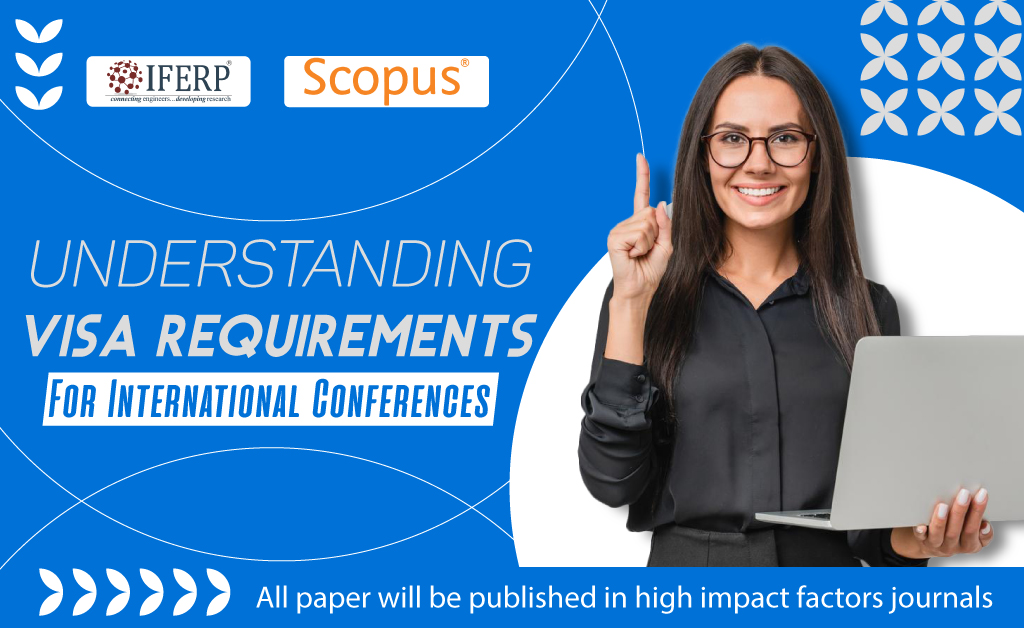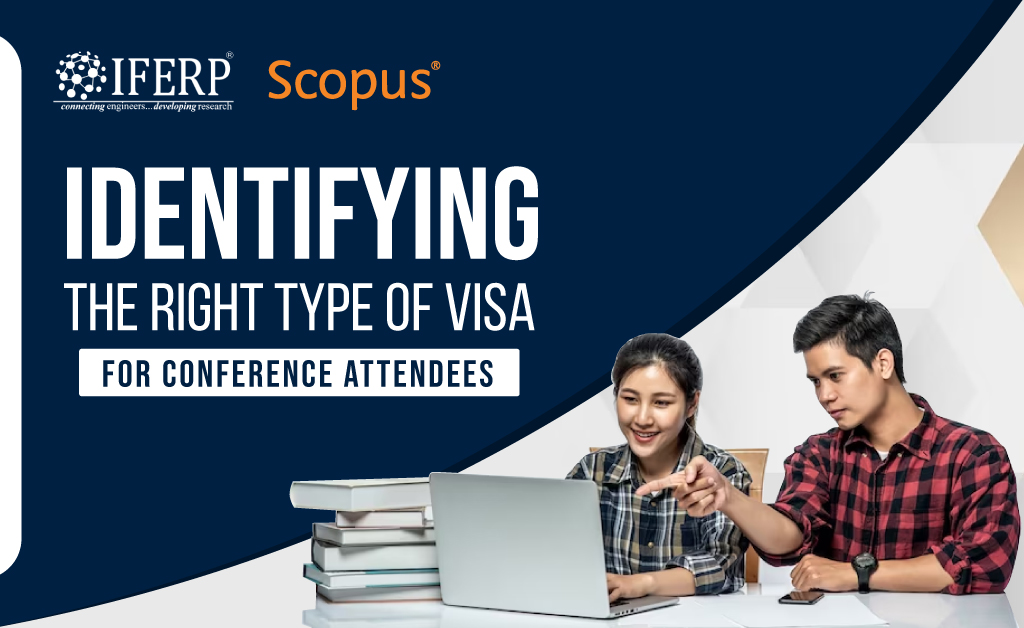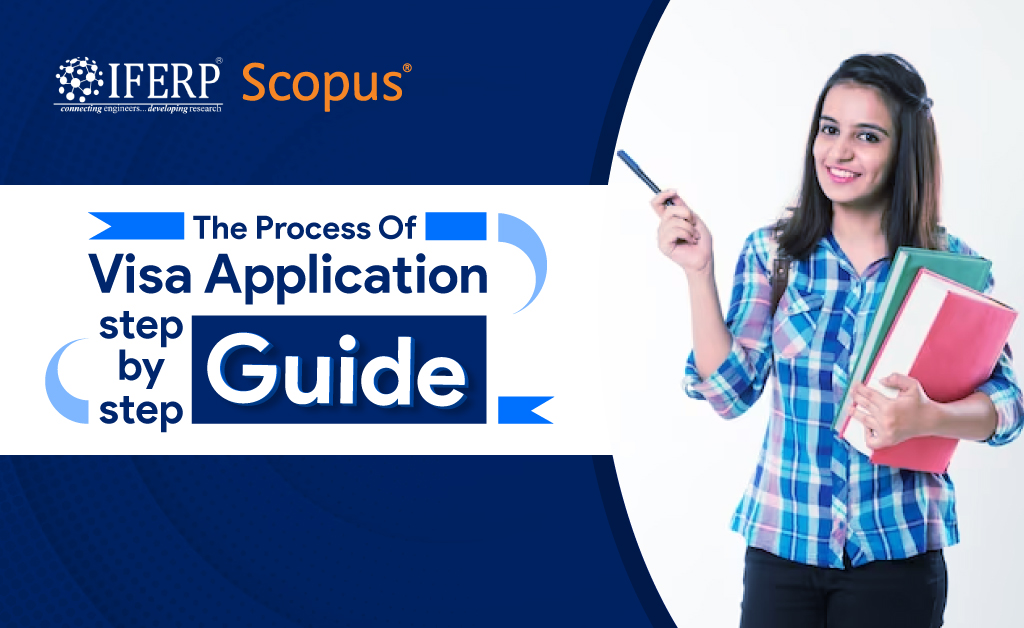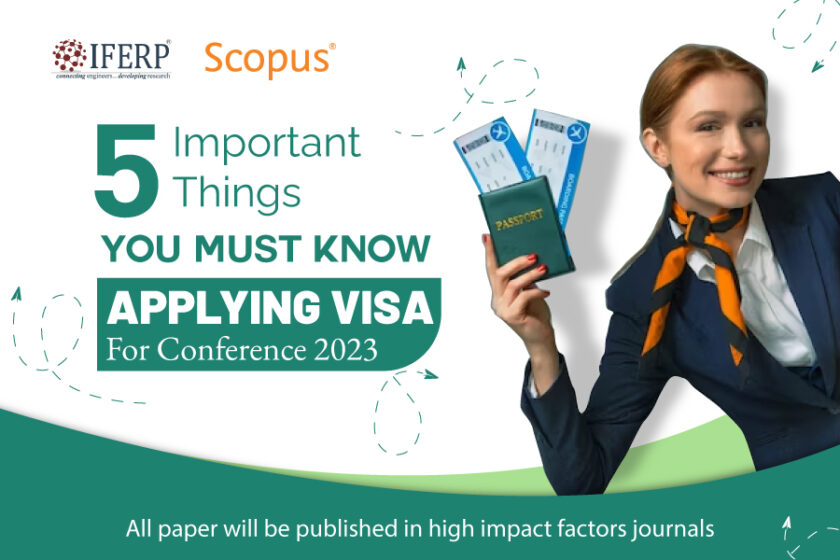Crafting a compelling invitation for an international conference 2023 is crucial to attracting the desired attendees. It’s about communicating the value, details, and opportunities the conference offers while also presenting a personal appeal to the invitee.
- Understanding Visa Requirements For International Conferences
- Every year, numerous conferences take place around the globe, enabling scholars, researchers, and professionals from various fields to share knowledge, network, and foster collaborations.
- However, to partake in these global discussions, it’s often necessary for attendees to cross international borders.
- This necessitates understanding and fulfilling visa requirements, a complex but crucial part of the conference attendance process.
- The Concept Of A Visa
- Before diving into the specifics, it’s important to grasp what a visa is.
- A visa, generally speaking, is permission granted by a country allowing a foreign national to enter, stay, or leave its territory. Visas are typically endorsed in a passport.
- For international conferences, attendees may need to apply for a specific type of visa, often called a “business” or “conference” visa, depending on the country’s immigration rules.
- Visa Requirements For Conference Attendees
- Visa requirements for anyone looking to attend conferences aboard (this is also applicable to foreigners who intend on attending a college conference in India) vary widely depending on several factors –
- The Country Of Origin
- Visa requirements can differ depending on an individual’s country of origin or where they currently reside.
- Some countries have bilateral or multilateral agreements that allow visa-free travel or simplified visa processes.

- The Destination Country
- Each country has its unique visa regulations and processes.
- The type of visa required, the documents needed for application, the fees, and the application timeline can all differ.
- Duration Of Stay
- The intended duration of stay can also influence the type of visa required.
- If the conference lasts only a few days, a short-term visa may suffice.
- However, if the attendee plans to stay longer for additional meetings, research, or sightseeing, different regulations might apply.
- Identifying The Right Type Of Visa
- Most countries offer a specific visa for individuals attending conferences, often categorized under business visas.
- Such a visa typically permits the holder to attend conferences, meetings, and seminars, but it does not allow the holder to engage in paid work in the host country.
- It’s important to apply for the correct type of visa to avoid potential legal issues.
- Gathering Accurate Information
- The most reliable source of information about visa requirements is usually the embassy or consulate of the destination country in the attendee’s home country.
- Most embassies maintain up-to-date websites with detailed information about visa requirements, application processes, and timelines.
- It’s crucial to gather this information well in advance of the conference to ensure there is ample time to complete the visa process.
- Understanding the visa requirements for international conferences is an essential step in preparing for global academic or professional gatherings.
- By familiarizing themselves with the different types of visas, knowing where to gather accurate information, and starting the process well in advance, attendees can ensure a smooth journey to their destination.
- While the process may seem daunting, the opportunities for knowledge exchange, networking, and global collaboration that a conference offers make navigating visa requirements worthwhile.
- If you’d like access to a list of fast publication Scopus journals, then relying on the IFERP platform is your best bet for getting the most authentic and up-to-date information.
- Identifying The Right Type Of Visa For Conference Attendees
- Traveling across international borders to attend a conference opens up a world of opportunities for learning, networking, and collaboration.
- One critical step in this process is obtaining the right visa.
- The type of visa needed varies depending on factors such as the destination country, duration of stay, and activities during the visit.
- Understanding these variations is key to a successful visa application and subsequent travel.
- Decoding Visa Types
- While the number and nature of visa types can vary between countries, they are typically categorized based on the purpose of the visit.
- These can include tourist visas, business visas, student visas, and transit visas, among others.
- For conference attendees, the two most likely relevant types are tourist and business visas.
- Tourist Visas
- Tourist visas are typically granted to individuals visiting a country for vacation or other non-business-related activities.
- In some cases, attending a conference may be permissible under a tourist visa, but this depends on the regulations of the specific country and should be confirmed before application.
- Business Visas
- Business visas are intended for individuals engaging in business activities, which often include attending conferences, seminars, and meetings.
- These visas typically do not permit the holder to undertake employment in the destination country.

- Conference/Business Visa – Which One To Choose?
- While it might seem straightforward to apply for a business visa for a conference, this is not always the case.
- The definition of “business activities” can vary by country, and some countries may have a specific visa category for conference attendees.
- It’s important to clarify with the appropriate immigration authorities whether your conference attendance should be classified as a business activity or whether a different visa type is more applicable.
- Misclassification can lead to complications, including visa refusal or issues at the border.
- Duration & Single Vs. Multiple Entry Visas
- Another consideration is the duration of your stay and the number of times you plan to enter the country during the visa validity period.
- For a single conference, a short-term, single-entry visa may be sufficient.
- However, if you plan to leave and re-enter the country or attend multiple events over a longer period, a longer-term or multiple-entry visa may be necessary.
- Visa Application Process
- Once the correct visa type has been identified, the application process can begin.
- This normally entails completing an application form, offering supporting documents (such as a passport, photos, and conference visa invitation letter), and paying a visa fee.
- The specifics of this process vary by country, and it may take several weeks or even months, so it’s advisable to start the process early.
- Identifying the correct visa type is a crucial step in planning for an international conference.
- By understanding the different visa types and seeking guidance from the appropriate immigration authorities, conference attendees can ensure that they apply for the most appropriate visa.
- Though the process can be complex and time-consuming, the benefits for anyone looking to attend an international conference (or even attend skill development programme) – from expanding one’s knowledge to building global networks – are well worth the effort.
- The Process Of Visa Application – Step-By-Step Guide
- Obtaining a visa to attend an international conference can seem like an intimidating undertaking, especially if you’ve never navigated the process before.
- However, with a clear understanding of the steps involved and some organized preparation, the visa application process can become a manageable component of your conference preparation.
- Step 1
Identify The Correct Visa Type
- As discussed in previous articles, the first step in the visa application process is identifying the correct visa type for your visit.
- This usually falls under either a business visa or a specific conference visa, depending on the country’s immigration rules.
- Look up the official immigration website of the country you plan to visit or consult with a travel agent to ensure you have the right visa category identified.
- Step 2
Gather The Required Documentation
- Each visa application requires supporting documentation.
- While the specific documents may vary depending on the country and visa type, some common ones include –
- Passport (must be valid for at least six months beyond your period of stay)
- Passport-sized photographs
- Completed visa application form
- Visa application fee
- Proof of accommodation arrangements
- Travel itinerary
- Conference invitation letter
- Proof of sufficient funds for the stay
- Ensure to check the list of required documents on the official immigration website.
- Step 3
Complete The Visa Application Form
- Most countries offer an online application process.
- Carefully fill out the application form and make sure all the information you provide is accurate and matches the details in your supporting documents.
- Remember to save or print a copy of the completed application for your records.

- Step 4
Pay The Visa Application Fee
- The visa application fee is usually non-refundable, and the amount may vary depending on the visa type and the country.
- Check the payment methods accepted by the immigration authority. In most cases, you can pay online.
- Step 5
Submit Your Application
- Some countries allow online submission of the application along with digital copies of supporting documents.
- Others may require you to make an appointment and submit the application and physical documents at a visa application center or consulate.
- Ensure to follow the procedure outlined by the immigration authority.
- Step 6
Attend The Visa Interview, if Required
- Certain countries require visa applicants to attend an interview.
- If this is the case, make sure to arrive on time and bring all your supporting documents.
- Be prepared to answer queries about your trip and your reason for attending the conference.
- Step 7
Wait For The Visa Decision
- Processing times can differ significantly depending on the country and time of year.
- It’s advisable to apply well in advance of your intended travel dates to accommodate potential processing delays.
- Though the visa application process may seem intricate, breaking it down into a step-by-step procedure can help make it manageable.
- Being diligent about following the necessary steps, staying organized, and starting the process early can help ensure a smooth visa application experience, paving the way for a successful international conference visit.
- Gathering Necessary Documentation For Visa Application
- The success of a visa application for an international conference often hinges on the completeness and accuracy of the supporting documents provided.
- Presented below is a comprehensive guide to help you gather the necessary documents for your visa application, ensuring that you have everything you need to make the process as smooth as possible.
- Understanding Basic Document Requirements
- Every visa application starts with a set of basic document requirements that are common to almost every country.
- These include –
- Passport
- Your passport has to be valid for a minimum of six months beyond your planned departure date from the visiting country.
- Some countries might also require that you have at least two blank pages.
- Passport-Sized Photos
- These photos must be recent and match the specific size and format requirements of the visiting country.
- Visa Application Form
- This must be filled out accurately with personal and travel information.
- Some countries offer an online form that can be completed digitally.
- Visa Application Fee Receipt
- The fee varies depending on the country and type of visa, and it’s typically non-refundable.
- Specific Documents For Conference Attendees
- In addition to the basic documents, those attending international conferences need to provide evidence related to the conference and their participation –
- Conference Registration Confirmation
- This document provides evidence that you are registered to attend the conference.
- Conference Invitation Letter
- This official letter is typically provided by the conference organizers, proving the purpose of your visit.
- Travel Itinerary
- Your travel plans, including entry and exit dates, should align with the conference schedule.
- Providing Financial Solvency Proof
- Visa authorities need assurance that you can cover your expenses during your stay.
- Therefore, they may request the following –
- Bank Statements
- These provide evidence of your financial stability. They should cover a period of the last three to six months, showing regular income or a stable balance.
- Proof Of Employment Or Income
- This could be a letter from your employer, a pay slip, or, if self-employed, a tax return document.
- Sponsorship Letter
- If someone else is covering your expenses, you’ll need a letter from them stating their intention to support you financially during your trip, along with their bank statements.
- Addressing Accommodation & Travel Arrangements
- Proof of where you will stay during your visit and your travel arrangements may also be necessary –
- Hotel Reservation Or Accommodation Proof
- This could either be a hotel booking confirmation or a letter from a friend or family member you plan to stay with, along with their address and contact information.
- Flight Reservations
- A round-trip reservation showing your entry and departure dates is often required.
- Ensuring Proper Document Format & Translations
- Remember that all documents should be in English or the official language of the country you are visiting.
- If not, they should be translated by a certified translator. Also, depending on the country’s requirements, documents may need to be photocopied or notarized.
- Gathering the necessary documents for a visa application can be a meticulous task, but it’s an integral part of the process.
- An incomplete or inaccurate application can give rise to delays or denials.
- Therefore, it’s critical to understand what documents are required, ensure they are correctly formatted, and submit them promptly.
- This preparation will help increase the likelihood of visa approval and set the stage for a successful international conference experience.
- Looking up tips for attend international conference, such as are published periodically in the IFERP blogs section, can also prove to be immensely helpful.
- Tips For A Successful Visa Interview
- The visa interview stands as a critical stage in the process of obtaining a visa to attend an international conference.
- It’s a moment for the consulate to ascertain the validity of your documentation, intentions, and overall application.
- Herein, we’ll delve into a variety of strategies to help you prepare and succeed in this crucial interview.
- Preparing For The Visa Interview
- Understand The Purpose Of The Interview
- The visa interview is designed to verify the information provided in your application and assess your intention to return to your home country after the conference.
- Understanding this can help you prepare your responses accordingly.
- Gather All Required Documentation
- Before your interview, make sure you have all necessary documents: your passport, application form, photographs, invitation letter from the conference, evidence of financial means, and any additional documents required by the embassy or consulate.
- Organize them neatly for easy presentation.
- During The Interview
- Dress Professionally
- First impressions matter.
- Dressing professionally conveys respect for the process and the official conducting your interview, and it may positively influence the outcome of your application.
- Arrive Early
- Being on time, or even a little early, can help reduce stress and give you a few moments to collect your thoughts before the interview begins.
- Communicate Clearly & Honestly
- Speak clearly, confidently, and truthfully.
- If you don’t understand a question, ask for clarification.
- It’s better to seek clarification than to guess and provide inaccurate information.
- Be Concise
- Keep your answers short and to the point.
- The consular officer doesn’t need to hear your entire life story, just enough to make an informed decision.
- Maintain Eye Contact
- Eye contact shows that you’re engaged and sincere.
- It can also convey confidence and respect to the interviewer.
- Post-Interview
- Stay Calm While Waiting For The Result
- After the interview, you may need to wait for a decision.
- Try to stay calm during this time.
- Remember, each application is unique, and processing times can vary.
- Respect The Decision
- If your visa is approved, congratulations! If not, don’t argue with the consular officer.
- Instead, politely ask for the reasons for the denial.
- This information can be useful for future applications.
- The visa interview can often seem intimidating, but with the right preparation, it doesn’t have to be.
- Being aware of the interview’s purpose, presenting a well-organized set of documents, dressing appropriately, arriving early, maintaining clear communication, and demonstrating respect for the process can significantly enhance your chances of success.
- Remember, the visa interview is a dialogue, not an interrogation.
- Confidence and honesty are the best tools for a successful conversation.
An effective international conference invitation letter serves as a potent tool in conference planning, ensuring potential attendees understand the event’s value, information, and personal relevance. Well-structured, detailed, and personalized, it can successfully inspire recipients to attend, contributing to a more diverse, engaged, and successful conference.


